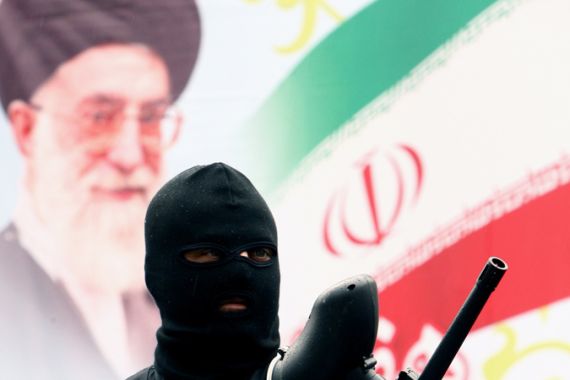Iran: domestic power plays
The storming of the British embassy in Tehran is part of a wider political game playing out in the Islamic Republic.

 |
| The Iranian paramilitary Basij (volunteer) forces remain a powerful force in Iranian domestic politics [EPA] |
London, United Kingdom – Tehran has once again sent shock waves around the globe as protesters stormed the British Embassy and residence forcing London to withdraw its diplomats from Iran at a critical time when Iranians are preparing for what Iran’s Intelligence Minister has labeled as “the most critical elections in the Islamic Republic’s history”.
Predictably, most commentaries have linked the attack to the International Atomic Energy Agency’s latest report, as well as the UK government’s decision to impose sanctions on Iran’s banking system. Although of some merit, these analyses fail to capture the whole picture by not allowing for domestic factors, which are clearly at play. It makes more sense if one tries to understand the domestic consumption of the attack within the context of an ongoing power rivalry between the Supreme Leader Ali Khamenei and the President Mahmoud Ahmadenijad.
At a time when the regime’s inability to stop covert actions has reduced the public fear of security forces, Tuesday’s event is being broadcasted as a “show of strength” by the state media, hoping that it will discourage the Green Movement activists from carrying on with their planned anti-government protests during the holy month of Muharram. It may also temporarily help the regime to divert attention from the ongoing shadow intelligence war evident in the fact that yesterday’s explosion at an IRGC (Army of the Guardians of the Islamic Revolution) base in Esfahan went largely unnoticed. More importantly, it is likely that Khamenei sanctioned the operation so to thwart the president’s effort to begin negotiations with the P5+1 Group (the 5 permanent members of the UN Security Council plus Germany). In an interview with Iran’s Jam-e Jam channel on Nov 26, Ahmadinejad had admitted the crippling effects of sanctions on Iran’s economy and talked of his willingness to address the international community concerns over Tehran’s nuclear program. Preferring isolation to engagement and believing that a crisis situation serves his political interest better, however, Khamenei is hopeful that yesterday incident will put negotiation off the table for an extended period of time.
Yet, the most interesting aspect of yesterday’s event is the key role played by the Student Basij Organisation (SBO) in carrying out the attack, which in turn implies that Ahmadinejad has lost a valuable political constituency in his fight against Khamenei.
Established on November 25, 1989, SBO is an ideological and political entity that aims at instructing university students on “how to work with various governmental institutions “, educating “future managers of the regime”, and defending the “values and achievements of the Islamic Revolution”. However, it was the election of former President Mohammad Khatami in 1997 that prompted the SBO’s political activism. Concerned with the university students’ contribution to the electoral success of Khatami, in a speech in January 1998 Ali Khamenei encouraged the Basiji students to take a more active part in politics. They responded to his call by playing an instrumental role in suppressing the July 1999 student movement. SBO then embarked upon aggressive campaigns to project a positive image of conservative figures and their political values, which were of paramount importance to the election of Ahmadinejad in 2005. Expectedly, ties between the SBO and the executive branch entered a new phase as Ahmadinejad began his presidency with the SBO responsible for defending and supporting the Ahmadinejad government and its policies at universities. The rigged 2009 election provided the SBO with yet another opportunity to prove its value to the government by helping the IRGC to identify and counteract dissident students and professors.
It is therefore a major blow to the Ahmadinejad camp that SBO followed the Supreme Leader’s order and attacked the British embassy while the Ahmadinejad team is trying to improve ties with the West and buy itself international prestige to boost its domestic standing. Today, IRGC and Basij are the most powerful political forces in Iran. Their backing is a prerequisite for anyone to be able to either remain in power or obtain power. Aware of this, both Khamenei and Ahmadinejad have sought to retain the armed forces on their sides by giving them a free hand in the market. But the more resourceful office of the Supreme Leader seems to have done a better job on this front. In fact, as Basiji students were savagely storming the embassy, Khamenei’s parliament moved forward with a bill that, if approved, would allocate 0.5 per cent of surplus annual oil income to the Basij.
As Iran approaches the parliamentary elections, it will be interesting to see how Ahmadinejad will compensate for this loss. He could, in theory, try to gain the support of highly disillusioned reformist voters but whether or not he can actually do this is unclear; after all, many reformists blame him for the post-election violence in Iran. Equally interesting will be to see how the SBO’s political role will evolve in the months ahead and whether or not some of its leaders will occupy high offices in the next Iranian government.
Nima Khorrami Assl is a security analyst at the Transnational Crisis Project in London.
The views expressed in this article are the author’s own and do not necessarily reflect Al Jazeera’s editorial policy.
